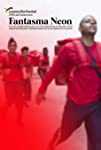Eye For Film >> Movies >> Neon Phantom (2021) Film Review
Neon Phantom
Reviewed by: Andrew Robertson

It opens with a litany, that which can be delivered via apps, goes through an operatic song. Then a fanfare, the squalling of a scooter engine, a few cubic centimetres stretched to distortion.
Testimony as voiceover, portraits of the workers. "This damnation is our only income." The apps control income, the consequences of a block are significant. This film is too, an absolute delight. Dance interludes on cobbled street, watched over by digital ghosts. In balaclavas and polo shirts brass instruments are held at port arms, the band a threat like the police, the customers, the streets.
The backpack is an anchor to real life. Leonardo Martinelli's film is a street level portrait of a class level conflict. The false smile on the Covid mask. Suggestions of brutality over sauces while there have been stories of real brutality from multiple sources. Not just through the app and its ratings but call and response. Ghosts and shades. It's not just Europe that is haunted by a spectre, Brazil has it even outwith the capital.
There are so many moments of beauty in this that it amounts to a gallery, a gathering. The haunting chorus of "get to work" before the ballet of the graffiti-clad plaza. The skies lost between the buildings. The stages set, "they told me it would be like a musical". It is, but not a happy one. Gustavo Andrade's sound and Felipe Quintelas' camera route this surreality in reality, set feet to soaring above the cobbles.
In a pre-recorded Q&A at 2022's Glasgow Short Film Festival Martinelli was asked about the genre clash at the heart of Neon Phantom. Documentary's existence in the real, and musical's focus on the posed, if not wholly artificial are contrasting, if not mutually exclusive. He talked about the influence of apps, that having one meant you had "a job", but that precarity, the presence of it to become something that is at once "intrinsic" and "invisible". Recruiting cast and crew with open calls online, artists, writers working in these roles because of economic conditions, joined. One sequence of dancers attracted the attention of a delivery worker who then joined the film himself. This level of participation helps ground the film even as its singing and dancing stylises it. I found myself thinking about the way that the demands of ostentatious 'realism' distorted the 2019 Les Misérables as a marked contrast to the way that the demands of ostentatious unrealism distort this. There it was not just notes but emotions that were flattened, here the choreographies of commerce, the crush of capital (both cities and cash) are foregrounded.
Chico Barque and Tom Jarbin were mentioned as influences, and that's one of the great strengths of these curated Q&As - my knowledge of South American political songs does not include Constracao but to know that it was not just an inspiration but a direct reference is a delightful detail. It's never been in doubt that the staff of GSFF are fans of film, but it's a genuine pleasure to have their insights available in this way. This is also true of the precariat of Brazil's delivery sector, workers who, like the eponymous neon phantoms, are invisible despite if not because of their obviousness. To explore that disconnect with something as ostensibly oxymoronic as a musical documentary is a flash of genius, as bright as the notification bell on a phone, and at least as compelling.
Reviewed on: 30 Mar 2022
















